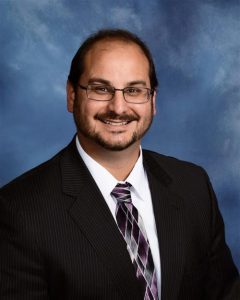Q & A with our Superintendent of Catholic Schools

There are 48 Catholic Schools and Early Childhood Centers in the Diocese of St. Petersburg that provide Catholic education to more than 12,000 students in the counties of Pinellas, Hillsborough, Pasco, Hernando, and Citrus. These students shine year-round but one week each year is devoted to highlighting what makes Catholic schools so special. National Catholic Schools Week begins on January 27 and in honor of this celebration, our diocesan Superintendent of Catholic Schools, Chris Pastura, sat down for a Q & A to provide a big picture overview of Catholic education in our region.

Are our schools thriving? If so, why?
I’m happy to report that Catholic schools in the Diocese of St. Petersburg are thriving. While Catholic school enrollment in the US has been declining by about 2% per year, our enrollment has been increasing by about 1% for each of the last seven years. Test scores show that the average 8th grader in one of our Catholic schools performs higher than 70% of his/her peers across the nation. Most importantly, each day our students are learning in an environment filled with prayer and love, where each one is called to a relationship with Christ and a commitment to “courageously live the Gospel.”
How are the schools keeping up with growing demands?
Our schools work hard to keep up with the changes in demographics and the ever-present need to maintain and renew facilities. Through the Diocesan Vision “Courageously living the Gospel,” we have committed to building a new school within the next few years. This requires a huge investment so we’re busy studying a number of factors to figure out the best location to serve the needs of our families. In addition, the diocese and our parishes are constantly working to keep our schools in great shape. We’re very proud of the condition of our school buildings that have been carefully maintained throughout the years. At the same time, sometimes new buildings are necessary. We have building projects currently underway at Clearwater Central Catholic, St. Petersburg Catholic, and Tampa Catholic to ensure that our students have learning environments ready for the challenges of the 21st century.
What are some of the strengths of Catholic schools in the DOSP?
Our communities of faith are what make us great.
It’s our teachers, administrators, pastors, and parents who work together to give our children an education of the highest quality informed by our Catholic faith.
How diverse are our Catholic schools?
Our schools serve diverse populations. For example, 26% of our students identify as Hispanic/Latino. Catholic means “universal”; we welcome every family who wants a Catholic education.
Are Catholic schools only for the wealthy?
It’s true that every Catholic school charges tuition. However, there is incredible economic diversity in our schools. Through the generosity of the people of the Diocese of St. Petersburg and innovative programs like the Florida Tax Credit scholarship, we are able to provide considerable assistance to families that qualify for tuition assistance.
How do our students do academically?
We emphatically believe that a child’s potential cannot be encapsulated by a test score. Having said that, our students perform at a very high level on national tests. By eighth grade, the average Catholic school student in the Diocese of St. Petersburg tests at the 70th percentile, meaning that they perform better than 70% of their peers across the country. Our high school student’s score in the top 25% in the nation in the ACT.
What can parents expect when they choose a Catholic education for their children?
The first thing parents will experience when they visit a Catholic school is joy. Working in a Catholic school is a ministry for our teachers and they work incredibly hard to create an environment where every student is loved and respected. Parents can be confident that the same values that they teach at home are reinforced at school. Most importantly, parents can be assured that their children are taught the importance of our Catholic faith n their everyday lives.
What are some of your priorities for the year ahead?
In keeping with our Diocesan vision, we will keep challenging our schools and students to courageously live the Gospel, not only in their classrooms, but in their homes, neighborhoods, and communities.

